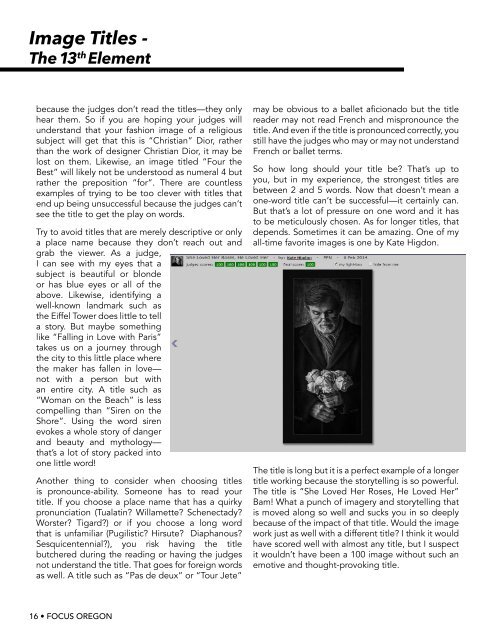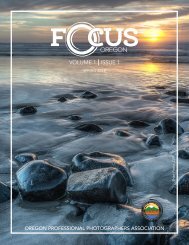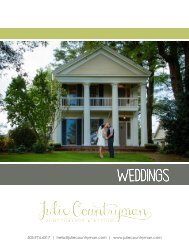V1 Issue 1
Create successful ePaper yourself
Turn your PDF publications into a flip-book with our unique Google optimized e-Paper software.
Image Titles -<br />
The 13 th Element<br />
because the judges don’t read the titles—they only<br />
hear them. So if you are hoping your judges will<br />
understand that your fashion image of a religious<br />
subject will get that this is “Christian” Dior, rather<br />
than the work of designer Christian Dior, it may be<br />
lost on them. Likewise, an image titled “Four the<br />
Best” will likely not be understood as numeral 4 but<br />
rather the preposition “for”. There are countless<br />
examples of trying to be too clever with titles that<br />
end up being unsuccessful because the judges can’t<br />
see the title to get the play on words.<br />
Try to avoid titles that are merely descriptive or only<br />
a place name because they don’t reach out and<br />
grab the viewer. As a judge,<br />
I can see with my eyes that a<br />
subject is beautiful or blonde<br />
or has blue eyes or all of the<br />
above. Likewise, identifying a<br />
well-known landmark such as<br />
the Eiffel Tower does little to tell<br />
a story. But maybe something<br />
like “Falling in Love with Paris”<br />
takes us on a journey through<br />
the city to this little place where<br />
the maker has fallen in love—<br />
not with a person but with<br />
an entire city. A title such as<br />
“Woman on the Beach” is less<br />
compelling than “Siren on the<br />
Shore”. Using the word siren<br />
evokes a whole story of danger<br />
and beauty and mythology—<br />
that’s a lot of story packed into<br />
one little word!<br />
Another thing to consider when choosing titles<br />
is pronounce-ability. Someone has to read your<br />
title. If you choose a place name that has a quirky<br />
pronunciation (Tualatin? Willamette? Schenectady?<br />
Worster? Tigard?) or if you choose a long word<br />
that is unfamiliar (Pugilistic? Hirsute? Diaphanous?<br />
Sesquicentennial?), you risk having the title<br />
butchered during the reading or having the judges<br />
not understand the title. That goes for foreign words<br />
as well. A title such as “Pas de deux” or “Tour Jete”<br />
may be obvious to a ballet aficionado but the title<br />
reader may not read French and mispronounce the<br />
title. And even if the title is pronounced correctly, you<br />
still have the judges who may or may not understand<br />
French or ballet terms.<br />
So how long should your title be? That’s up to<br />
you, but in my experience, the strongest titles are<br />
between 2 and 5 words. Now that doesn’t mean a<br />
one-word title can’t be successful—it certainly can.<br />
But that’s a lot of pressure on one word and it has<br />
to be meticulously chosen. As for longer titles, that<br />
depends. Sometimes it can be amazing. One of my<br />
all-time favorite images is one by Kate Higdon.<br />
The title is long but it is a perfect example of a longer<br />
title working because the storytelling is so powerful.<br />
The title is “She Loved Her Roses, He Loved Her”<br />
Bam! What a punch of imagery and storytelling that<br />
is moved along so well and sucks you in so deeply<br />
because of the impact of that title. Would the image<br />
work just as well with a different title? I think it would<br />
have scored well with almost any title, but I suspect<br />
it wouldn’t have been a 100 image without such an<br />
emotive and thought-provoking title.<br />
16 • FOCUS OREGON





